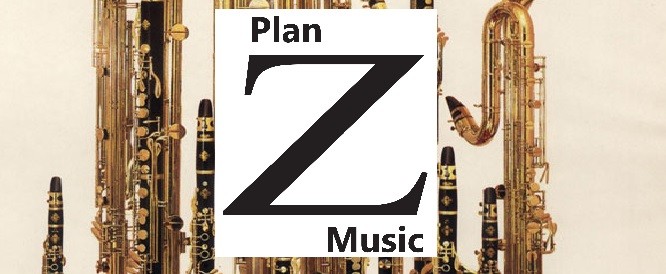Plan Z Music is dedicated to providing high quality publications to instruct keen learners of woodwind instruments at all levels.
Educational music publisher, Plan Z Music, was founded in 2015 to publish step-by-step handbooks by Paul Copas to help students of woodwind instruments develop their technical knowledge and facility.
Learn Your Scales and Arpeggios for clarinet was originally published in three volumes in 2015, shortly followed by Learn Your Scales and Arpeggios for Saxophone. The same material is now available for download on a lesson-by-lesson basis from this website.
About Paul Copas
Born in 1958 and educated at The Royal Grammar School, High Wycombe, Paul Copas studied at the Royal Academy of Music from 1978 to 1983 under John Davies, Antony Pay and Richard Addison. Whilst a student, he won numerous prizes and scholarships including the Geoffrey Hawkes Prize for Clarinet Playing, the Martin Musical Scholarship, a Leverhulme Scholarship and the ESU Robert Mayer Aspen Scholarship. In addition to obtaining LRAM and LTCL teaching diplomas, he was awarded a Dip. RAM Recital Diploma. Paul has performed extensively in London and participated in festivals abroad, pursuing a particular interest in chamber music. He founded the Copas Ensemble during the 1980s to combine new and 20th century repertoire with more established works and received funding from the Arts Council of Great Britain to develop new music theatre repertoire.
He has taught at several schools and was Clarinet and Saxophone Teacher at Harrow School for 16 years. He currently teaches both instruments at Chelmsford County High School for Girls and King Edward VI Grammar School for Boys, also in Chelmsford. He has also built up a successful teaching practice at home.
The lessons for download and books published by Plan Z Music are a formalisation of the methodology Paul Copas has developed and applied in his own teaching with considerable success over a period of more than 30 years.
About the publications
Scales and arpeggios pose a particular difficulty for wind players in that there are few simple, recognisable patterns of fingering. Keywork is attached to the instrument in all sorts of odd places, in what can seem like a haphazard manner; some keys open holes when depressed, some close holes and there are many alternative fingerings. To rise to the demands of orchestras, chamber ensembles, jazz bands, solo performance, the player must have an ability to navigate through all the keys that is so securely based that it has become, effectively, instinctive. This can only be achieved through repetitive practice over a long period of time. The full technical requirement for the most advanced graded exams can take several years for the average student to acquire. The disciplines required to acquire facility – one might say literacy – in all the tonalities should be applied from the earliest possible stage of learning as the whole process is cumulative.
This presents something of a challenge to both student and teacher: students find the drudgery unbearable, whilst teachers are reluctant to be drawn into conflict over the issue. Some respond by attempting to ignore scales and arpeggios altogether, but progress cannot be made that way. We have come to the conclusion that simply to present students with a book of scales and tell them to get cracking does not work in most cases. What is needed is a method which presents the material in manageable portions and guides the student through daily practice. This series of lessons in worksheet form attempts to fulfil that need. The theoretical background, fingerings and fingering patterns are explained on a lesson by lesson basis with exercises to enable the student to assimilate the various coordinations. Each lesson is followed by a six-day practice schedule. Thus the student is guided at every stage. This does not in any way diminish the rôle of the teacher. There is material for use in the lesson and the teacher should ensure that everything is understood and exercised so that the practice schedules can be followed effectively through the ensuing week.
